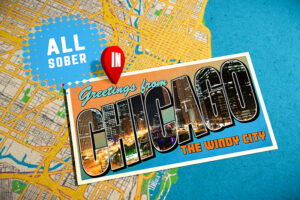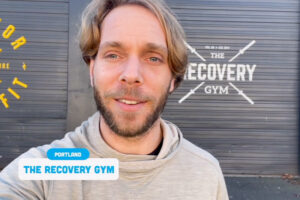How To Hack the Holidays in Recovery
It's perfectly normal to feel anxious or triggered around this season and all its so-called merriment. But you don't need to fear Christmas and New Year's. Just keep a few things in mind

What is it about this dang holiday season that makes recovery so challenging? It should be, at least everyone says, the most wonderful time of the year, a time of joy and celebration. And you have plenty to celebrate: You have beaten the odds to even get here in recovery. You’re in a place in your life you once thought impossible, or at least unlikely.
But there’s a lot going on during the holidays that you don’t have to deal with in your normal sober routine.
For some, it’s simply the contrast of the environment that can wreak havoc on their internal serenity; when everything appears bright and cheery, it can spark memories of active addiction that are dark and dreary. Others may see everyone else seeming to engage in “normal” celebratory behavior with substances and alcohol, and start to forget that that behavior was toxic for them. Or they just feel a little left out, or wistful. (By the way: Not everyone else is.)
Anyone outside a holiday movie — and most characters in one — could tell you the holidays can also bring tremendous stress and triggers. In recovery, you may struggle with the holiday season for any number of reasons, such as not having family and friends to celebrate with, having too many family members or friends you don’t want to celebrate with, or worrying about being around drugs or alcohol.
But remember, you’ve gotten and stayed sober through worse. You can be sober during the holidays — and you might even like it.
Dasher, Dancer, Prancer and Triggers: What To Watch Out For
A concept that you’ve probably encountered at least a few times in recovery is that of “triggers.” Triggers are those external stimuli or internal thoughts that can bring up the desire to use in those recovering from addiction.
These triggers often come up when you’re confronted with elements of your old behavior or life. There is a saying in many 12-step programs that goes, “people, places and things.” This is to remind group members that triggers are often associated with the people, places and, well, any other external things that were once prominent in their addiction days. The holidays can feel like one big party, and all your people, places and things are invited.
1) People
First, there are the “people.” The holidays are often celebrated with the same family, friends and coworkers year in and year out. That likely means you will celebrate the holidays with the same people now, in your recovery, as you once did while in active addiction, and they may not be people you spend time with in your day-to-day life. You may not spend time with them for good reason!
At very least, seeing these people engage in the same behavior you are now avoiding can be triggering.
2) Places
Now let’s look at the “places” around the holidays. The holidays are often celebrated somewhere away from home, which many people in recovery have designated a safe space. Take the classic holiday work party, for example. There’s often a lot of alcohol and the potential for seeing many coworkers using it liberally. Someone in recovery may feel they need to attend because it’s linked to their job, so they can certainly feel trapped and triggered in this environment.
3) Things
The primary “things” we’re talking about here are drugs and alcohol. Simply seeing these substances can cause some in recovery, especially early recovery, to feel shaky. Seeing these substances can trigger old impulses and cravings, can make you feel like engaging in those old behaviors might not be so bad, or can just make you feel like you’d rather be anywhere else.
You’re Not Alone in Feeling Blue During the Holidays
Feeling triggered around the holidays is extremely normal for those in recovery. Remember that. While no one’s recovery is identical, many people’s journeys follow some of the same general contours.
That’s why establishing a sober network in recovery is so important and so helpful. Establish relationships with others who are going through, or have been through, the same types of situations you are.
These are the people that you can lean on in triggering times. They may even be the difference between continued recovery during the holidays and a dangerous relapse. Or, you know, they may just be someone else you can talk to when you need a break from your “people.”
However, creating this network is not the only tool you can use to stay healthy over the holidays.
Some Tips for Getting Through It
The first suggestion sometimes given to folks in recovery during the holidays is often waved away, but here it is anyway: You don’t have to do the holidays at all. What’s more important, your sobriety and your new life, or potentially upsetting a few friends or family? You did not enter a life of recovery to be uncomfortable, especially if that means a situation that jeopardizes your recovery. You don’t owe anyone that.
Another good one: Make a plan and have an exit strategy. If you know there will be a lot of alcohol use at a Christmas party, for example, make sure you have nonalcoholic options for yourself. Have a number to call in your sober network if you begin to feel triggered. Maybe you want to have a reason to give if it’s time to get out of a situation that’s dragging on you. But you don’t need an excuse.
Most likely, this early-days feelings of discomfort around the holidays will pass as you grow and gain confidence in your recovery. Others may not see it yet (though some probably will), but no holiday celebration can be as fantastic as the gift of sobriety you have given yourself.
More Lifestyle
The Definitive Guide to Sober Travel
Vacations shouldn't be nerve-racking, but in recovery, it's not always that simple. We asked three sober travel pros how to make your trips fun — and more fulfilling than ever.
Sure-Bet Sober Date Ideas
Ready to get back out there? Sober dating isn't so hard. But here are a few pointers anyway, to help you find your groove.
Sobriety Roundtable: What's Your Favorite Sober Activity?
From roller derby to CrossFit and dog fostering to splurging on Mexican, nine sober folks shared what they do for fun and fulfillment. Get some ideas for your own Dry January or longer-term sobriety!
The Joy of Baking (Sober)
Two months sober, Annie Zimmerman decided to make cookies. Now, her hobby turned passion yields fulfillment, connection and delicious soberversary cakes. Read the interview!
Now Elite NFL Players, They First Tackled Addiction | News Roundup
All Sober compiles the best of the latest headlines. Here's your addiction and recovery news for the week of Feb. 19, 2024!
All Sober in Chicago
A great town for recovery, come sun, rain or snow! Check out our video guide to the Windy City's best sober options for bars, bottle shops — and even an arcade with vintage games.
All Sober in New York
The Big Apple truly has it all — including a sober bar with a "witchy vibe" and an array of enchanting non-alc cocktails. Take a peek in our video guide to the sober city!
All Sober in Portland
Oregon's cultural capital may be weird and proud, but it's sober and proud too! We scoped out the coolest sober-friendly spots in our new video guide.










